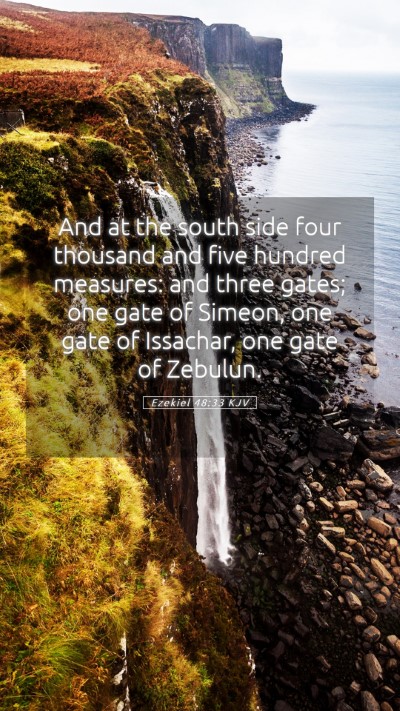Ezekiel 48:33 - Interpretation and Meaning
Ezekiel 48:33 states: "And at the east side four thousand and five hundred: and three gates; and one gate of Joseph, one gate of Benjamin, one gate of Dan." This verse is part of the concluding chapters in the book of Ezekiel, where the prophet describes the future vision of Israel's restoration and the allotment of land to the tribes.
Overview of Ezekiel 48
The final chapter of Ezekiel presents a detailed account of the land distribution that God has ordained for the tribes of Israel. Each tribe receives a designated portion, with the city of Jerusalem at its center. This vision encapsulates the hope of a renewed relationship between God and His people, emphasizing order, holiness, and divine presence within Israel.
Commentary Insights
Matthew Henry's Commentary
Matthew Henry emphasizes the significance of the gates mentioned in this verse. He discusses how they symbolize access to God’s people, and with specific gates assigned to different tribes, they reinforce the idea of unity among diversity. This reinforces the notion of each tribe having its unique identity while being part of the larger community of Israel.
Albert Barnes' Notes
Albert Barnes highlights the east side's gates and interprets their names as reflective of the tribes' histories and roles within Israel. He notes that the gates of Joseph, Benjamin, and Dan signify the importance of these tribes in God’s plan. Their specific mention shows their prominence, especially as they relate to both historical context and future promises.
Adam Clarke's Commentary
Adam Clarke elaborates on the geographical and symbolic dimensions of this part of Ezekiel's vision. He deeply analyzes the layout of the city and how the gates function not just as entry points but as divine invitations for fellowship with God. Clarke brings attention to the perfection of divine order seen in this measurement and division, which serves as a reflection of God’s ultimate plan for His people.
Significance of the Verse
This verse encapsulates profound theological principles relevant for Bible study today. It offers insights into God's faithfulness and the future hope He holds for His people. The gates serve as metaphors for access to God, reflecting the ways in which believers today can approach Him through Jesus Christ, much like the tribes accessed their place in the divine kingdom.
Application to Daily Life
In applying the lessons from Ezekiel 48:33 to our daily lives, believers can consider the importance of community and identity within the body of Christ. Each individual, like each tribe, has a unique role and purpose. Furthermore, understanding the symbolic nature of the gates encourages a deeper appreciation for the open access to God provided through Christ, encouraging believers to take part in fellowship, worship, and service within their communities.
Cross References
- Revelation 21:12-14 - Discusses the gates of the New Jerusalem and their connection to the tribes of Israel.
- Ezekiel 37:21-22 - The promise of the reunification of Israel and Judah, giving context to the significance of the tribes.
- Isaiah 60:11 - Foretelling the glory of the future city of God, where nations and kings will bring their glory and honor.
Conclusion
Ezekiel 48:33 contains rich meanings and profound implications for understanding Scripture. The insights from public domain commentaries illuminate the complexities and beauties of this verse, providing a valuable resource for anyone engaged in Bible study. Through this verse, we see God's meticulous planning and promise, encouraging believers to grasp the fullness of their identity within the faith community and the access to divine fellowship.


